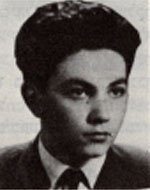Yigal (Pablo), son of Fanny and Aaron Boxer, was born on June 19, 1940, in Poland, after being occupied by the Nazis during the Second World War. His father served in the Polish army and his mother fled with her baby to a village on the Russian border, where she hid until the end of the war. Yigal and his younger brother, Adam, studied in a Polish school and did not receive a Jewish and Zionist education. The Sinai Campaign aroused his Jewish identity and at the age of eighteen he decided to immigrate to Israel. In 1959, without any absorbing family or any address, he arrived in Israel. Upon his arrival he joined the studio at Kibbutz Dovrat and changed his name to Yigal Arad. After six months of studying Hebrew, he was drafted into the IDF, equipped with very little knowledge of speaking, writing and writing the Hebrew language, and did not like regular military service. At the time, his uncle’s house was in Tel Aviv, and he rented a small room for himself after he left the regular army, working in heavy equipment and living in a rented room in Haifa, where he made a real connection to the army. He was very fond, and the soldiers of the brigade became friends after the period of reserve duty, and here he became attached to real friends and from there “I always wondered how he, the new immigrant, was familiar and loved everyone in the street, and I – who had been living for 20 years In Haifa – knows fewer people than he does, “says Ziva, his wife whom he married in 1964. In 1966, their daughter, Tami, was born when his mechanical equipment company broke up and moved to a cold storage company where he worked hard shifts. To work at the electric company. After an interview with the company’s CEO, Yigal went to study in a production technician course and worked in production engineering at the Israel Electric Corporation, and he became very fond of all the employees of the department and worked with them. He bravely defended the task of bandaging the wounded and evacuating his heroic deeds in the difficult battle over Jerusalem. He received a commendation from the chief of staff and was later awarded the “Medal of Valor”. During the War of Attrition, during the War of Attrition, Yigal and Yigal were the only company commanders to rescue the wounded, and the period of his service in operational employment was in the area of the battles in the Jordan Valley and during the war of attrition in the Suez Canal. “He saved my leg when he did not lose his mind under fire and fixed it properly, contrary to the instructions of the stunned doctor who was there,” said his commander, Micha, “I was not afraid of myself. “Said Yigal after the battle,” I’ll manage. But the responsibility for the lives of the people who depended on my help was what pushed me. “Yigal, who had accumulated all the tension and effort of his absorption, hardened the periods of” hot “reserve, suffered an ulcer, and for a long time did not attribute any importance to his pain. The X-ray, which was done to him in the hospital in Gaza, revealed a large wound in his stomach, and he suffered greatly, and the severe diets at home did not help either. , His wife was convinced that he would return the next day, after explaining to his commanders his health. He overcame his agony with medication, Fasting most of the time, because he needed dietetic food that was not available. The vigorous medical letter, which he demanded to be returned for surgery, was too late. On October 24, 1973, Yigal was killed by a direct hit when he was in an armored personnel carrier during the break-in to the city of Suez, and his body remained in the city and was returned after a few months when a cease-fire agreement was signed with the Egyptians. he was buried in the military cemetery in Haifa, leaving a wife, a son and a daughter, was promoted to the rank of First Sergeant, and in the 2017 investigation it was emphasized that the chief of staff’s citation was converted to a medal of courage.
